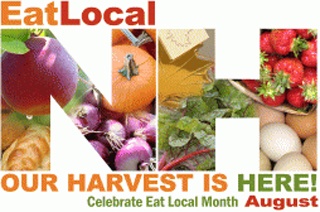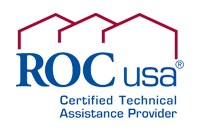
12 reasons to Eat Local
By Charlene Andersen
Eating local is a big deal. It matters for reasons that go far beyond food freshness.
We’re fortunate here in New Hampshire. We have many choices of where and from whom to purchase our food. Some may be grown organically up the street by a farmer we call friend, some from a factory farm across the Pacific whose farming practices we don’t know.
The New Hampshire Community Loan Fund supports local food—from field to market—year-round through our Farm Food Initiative. And throughout August, starting today, we’re putting our metaphorical mouth where our money is by honoring the N.H. farmers, producers, restaurants, markets, brewers and mead makers whose products we enjoy.
 If you’re on social media this month, chances are you’ll see messages containing the hashtag #NHEatLocalMonth. New Hampshire Eat Local Month is a statewide celebration of farmers and local food producers led by Monadnock Buy Local; N.H. Dept. of Agriculture, Markets & Food; Seacoast Eat Local; and NH Farms Network. The Community Loan Fund is just one of 50+ businesses and organizations stirring the pot on social media.
If you’re on social media this month, chances are you’ll see messages containing the hashtag #NHEatLocalMonth. New Hampshire Eat Local Month is a statewide celebration of farmers and local food producers led by Monadnock Buy Local; N.H. Dept. of Agriculture, Markets & Food; Seacoast Eat Local; and NH Farms Network. The Community Loan Fund is just one of 50+ businesses and organizations stirring the pot on social media.
Now, if you grew up rurally, you might wonder what the big deal is. Fresh, local food from the farm stand was probably part of your daily life.
But eating local is a big deal. It matters for reasons that go far beyond food freshness. Here are some reasons to buy and eat local:
Taste the difference
Most local produce at a farmers’ market has been picked within 24 hours. It comes to you ripe, fresh, and with its full flavor, unlike supermarket food that may have been picked weeks or months before. Close-to-home foods can also be bred for taste, rather than to withstand the abuse of shipping or industrial harvesting.
Know what you’re eating
Buying food in a mindful way is complicated. What pesticides were used? Is that corn genetically modified? Was that chicken free-range, or did it grow up in a box? People who eat locally find it easier to get answers. Many build relationships with farmers whom they trust. And when in doubt, they can drive out to the farms and see for themselves.
Get in touch with the seasons
When you eat locally, you eat what’s in season. Peaches, corn and tomatoes are the taste of the summer, apples and cider are tastes of the fall. In winter, we enjoy comfort foods like squash soup and roasted potatoes. When we eat seasonally, we are eating foods when they're at their peak taste, most abundant, and the least expensive.
Eat safety
Locally grown food retains more nutrients and is less likely to cause food borne illness than food shipped from far away. The longer food takes to get to its destination, the more it is susceptible to mishandling and food-borne illness.
Explore your community
Visiting local farms is a way to be a tourist on your own home turf, with plenty of stops for snacks. This is also a great family activity.
Discover more flavors
Local food promotes variety and genetic diversity. Ever tried sun chokes, pea shoots, purple potatoes, Easter egg radishes, Lacinato kale, atomic red carrots?
Preserve green space and farmland
In N.H., the loss of open space would decrease tourism, the state’s largest industry. Land that has been developed can become contaminated and lose its topsoil and fertility.
Decrease your environmental impact
Buying local saves on transportation and energy costs, reducing pollution and the use of fossil fuels. Most small- and mid-size farms use practices that reduce their need for synthetic fertilizers and pesticides.
Support the local economy
A dollar spent locally generates twice as much income for the local economy. Buying local also saves and creates jobs.
Support wildlife
Most farms include fields, forest, meadow, ponds and streams, all of which provide essential wildlife habitat.
Keep your local taxes in check
Farms contribute more in taxes than they require in services. Suburban development costs more than it generates in taxes.
Maintain and build food systems
Buying local ensures a safe and reliable source of food whose supply is less likely to be interrupted by natural disaster or other events.
We hope you’ll join us in celebrating the entrepreneurs creating these ripple effects during NH Eat Local Month.
Charlene Andersen is the Manager of Business Education for the Community Loan Fund's Business Finance team.















